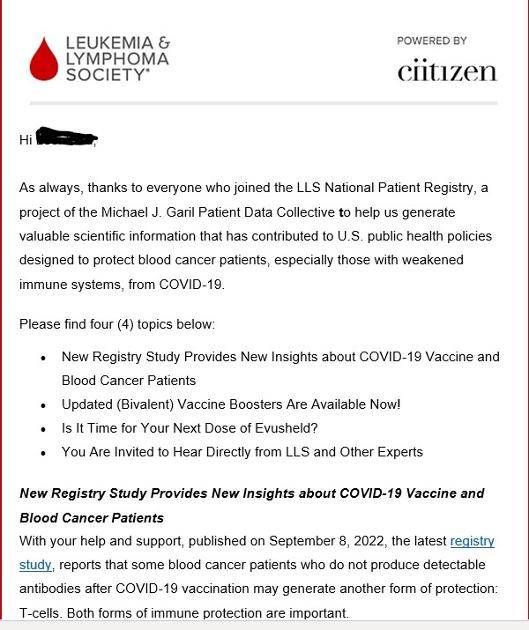lls.org/news/study-leukemia...
As always, thanks to everyone who joined the LLS National Patient Registry, a project of the Michael J. Garil Patient Data Collective to help us generate valuable scientific information that has contributed to U.S. public health policies designed to protect blood cancer patients, especially those with weakened immune systems, from COVID-19.
Please find four (4) topics below:
• New Registry Study Provides New Insights about COVID-19 Vaccine and Blood Cancer Patients lls.org/news/study-leukemia...
• Updated (Bivalent) Vaccine Boosters Are Available Now!
• Is It Time for Your Next Dose of Evusheld?
• You Are Invited to Hear Directly from LLS and Other Experts
New Registry Study Provides New Insights about COVID-19 Vaccine and Blood Cancer Patients
With your help and support, published on September 8, 2022, the latest registry study, reports that some blood cancer patients who do not produce detectable antibodies after COVID-19 vaccination may generate another form of protection: T-cells. Both forms of immune protection are important.
High antibody levels can completely neutralize the virus, preventing it from entering our cells to avoid infection completely. T-cells work later in the process, attacking the virus once it is inside our cells, limiting its ability to cause severe disease.
Our latest study, published in the Journal Blood Cancer Discovery, shows that blood cancer patients can have varying responses to COVID-19 vaccination. Some will have both detectable antibodies and activation of their T-cells, while others will have neither. Many blood cancer patients fall somewhere in between: have antibodies but no T-cells, or T-cells but no antibodies. These differences are likely related to the type of blood cancer they have and its treatment, which can affect B-cells, which are responsible for making antibodies, or T-cells.
So, what does all this mean? It means blood cancer patients should get vaccinated but act unvaccinated. Get all vaccine doses as recommended by public health officials—they are safe, and most patients will have at least some benefit—but don’t throw away your mask just yet.
Updated (Bivalent) Vaccine Boosters Are Available Now!
New bivalent booster vaccines are designed to provide broader protection against the viruses that cause COVID-19, including the currently circulating Omicron variant and the original strain. This new booster is recommended for everyone 12 years of age and older.
The Pfizer-BioNTech and Moderna bivalent boosters are interchangeable for adults 18 and older—you can get either one regardless of which brand you received earlier. But only Pfizer-BioNTech is approved for children 12 to 17 years of age. For now, the original (monovalent) booster is the only one recommended for children younger than 12, but CDC expects to move them to the new bivalent booster soon.
The bivalent booster should be given at least two months after completing the primary vaccination series or receiving the most recent booster shot, or 4-months after a recent Covid-19 infection.
LLS encourages blood cancer patients to get the new bivalent booster as soon as they are eligible.
Is It Time for Your Next Dose of Evusheld?
The monoclonal antibody Evusheld is recommended every six months for blood cancer patients and others who are high risk of serious outcomes from COVID-19 and who may not get optimal protection from vaccines.
If it’s time for your next dose, or if you never had one but believe you are at risk, please contact your healthcare team today to inquire about getting Evusheld.
Evusheld is an infusion of “ready-made” antibodies that are given by injection. They provide at least some immediate protection compared to vaccines, which take a few weeks to work, but they only last a short time, which is why you need them every six months.
Please remember that if you have a weakened immune system because of your cancer or its treatment, you should continue taking other precautions, like masking and social distancing, when possible, even if you are fully vaccinated and have taken Evusheld.
You Are Invited to Hear Directly from LLS and Other Experts
Join us on Thursday, October 20 as we bring together a panel of experts for an update on what we are learning about COVID and blood cancer patients, including data on infections and reinfections across blood cancer types and the effectiveness of Evusheld and COVID-19 vaccines.
Click here to learn more and register for this free event happening on Thursday, October 20 at 1:00 pm Eastern/10:00 am Pacific time. tlls.zoom.us/webinar/regist...
LLS Information Specialists Are Just a Phone Call Away
You can reach LLS Information Specialists by phone, email or even live chat for up-to-date disease, treatment and support information. Their contact information is here. lls.org/support-resources/i...
The U.S. is still experiencing more than 80,000 new COVID infections and about 400 COVID-related deaths every day. These numbers are expected to rise in the fall and winter, making this a critical time to review what you can do to stay safe.
Sincerely,
Larry Saltzman, MD
Executive Research Director, LLS National Patient Registry
Lee Greenberger, PhD
LLS Chief Scientific Officer
